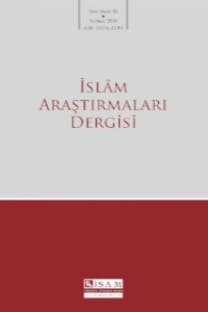Varlık Kavramının Bedâhetine Delil Getirilebilir mi? Müteahhirîn Dönemi Merkezli Bir Tartışma
İslâm felsefesinde düşünme sürecinin geriye doğru teselsülünden kurtulmak için varlık kavramı apaçık kavramlardan kabul edilmiştir. İbn Sînâ, varlık kavramının apaçık olduğunu ve apaçıklığı için kanıt ileri sürülemeyeceğini; ancak zihnin uyarılması amacıyla bazı lafzî tarifler yapılabileceğini söylemiştir. Râzî ise varlığı apaçık kabul etmekle birlikte, bu apaçıklığın ispatı için üç delil önermiştir. Onun önerdiği deliller, İbn Sînâ felsefesi doğrultusunda sonraki düşünürler tarafından eleştirilmiş ve delillerin varlık kavramının apaçıklığını ispatlamaktan uzak olduğu belirtilmiştir. Bu makale, İbn Sînâ’dan müteahhirîn döneme kadar olan süreçte varlığın bedâheti ve bu bedâhetin ispatı için delil getirilip getirilemeyeceği tartışmalarını değerlendirmekte ve söz konusu üç delili metinler üzerinden tartışmaktadır.
Anahtar Kelimeler:
Varlık, bedâhet, İbn Sînâ, Râzî, müteahhirîn, İslâm felsefesi, kelâm.
Is It Possible to Present Evidence for the Self-Evidence of Existence? A Discussion from the Mutaakhkhirīn Period
In order to negate the regressus ad infinitum tasalsul , Islamic philosophy consid- ered that the concept of existence is a self-evident one. Avicenna Ibn Sīnā argued that the concept of existence is self-evident and requires no proof or explanation but it might be given literal definitions for the stimulation of mind. Fakhr al-Dīn al- Rāzī, on the other hand, suggested three arguments as a proof for the self-evidence of existence. These arguments have been criticized by later philosophers based on Avicennan view; these philosophers have stated that these arguments fall far short of proving the issue. This article aims to offer an overview of the debates on the self evidence of existence and its possible proofs, from the Avicennan period to that of later philosophers, and also discuss the arguments of Fakhr al-Dīn al-Rāzī with reference to relevant texts
Keywords:
Existence, self-evidence badāha, Avicenna Ibn Sīnā, Fakhr al-Dīn al-Rāzī, mutaakhkhirīn, Islamic philosophy, Islamic theology kalām,
- ISSN: 1301-3289
- Yayın Aralığı: Yılda 2 Sayı
- Başlangıç: 1997
- Yayıncı: TDV İslâm Araştırmaları Merkezi
Sayıdaki Diğer Makaleler
Varlık Kavramının Bedâhetine Delil Getirilebilir mi? Müteahhirîn Dönemi Merkezli Bir Tartışma
Gazzâlî ve İnsan Sorunu: Mişkātü’l-Envâr’a Özel Bir Vurguyla
Ma‘dûm ve Mümkün: Mûtezile’nin “Ma‘dûm” ve İbn Sînâ’nın “Mümkün” Kavramı Üzerine Değerlendirmeler
Tartışmalı Bir Eser: Târîh-i İslâmiyyet ve Yasaklanış Süreci
